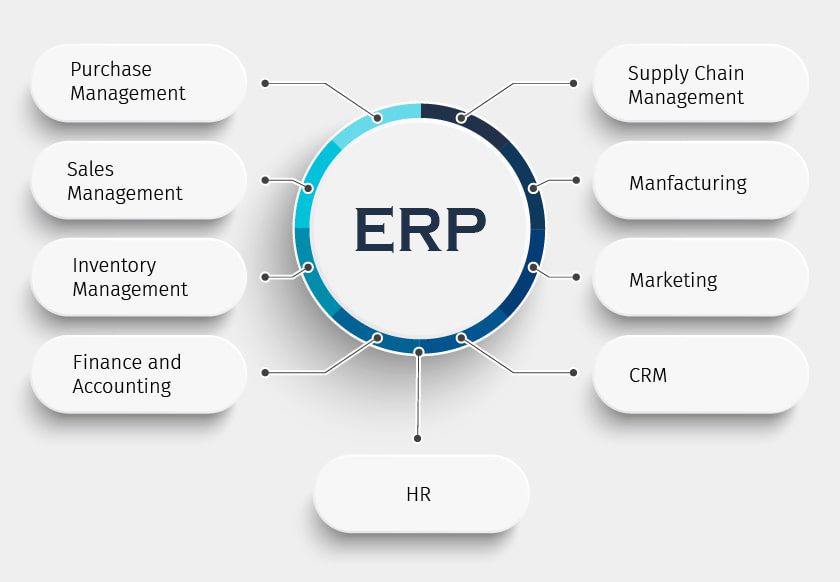Knowing that most business professionals in need of maintaining and operating resource processes in digitized automated form, use “ERP” they may not know exactly what Enterprise Resource Planning (ERP) software should they adopt for their teams.
An ERP system serves as a comprehensive Business Process Management software suite, offering seamless access to data and consolidating various applications for efficient business operations.
This integrated solution plays a pivotal role in managing and automating essential processes, ensuring the streamlined collection and organization of key business information.
From Accounting and Human Resources to Sales, Manufacturing, Supply Chain, and Inventory Management, an ERP system serves as the backbone, fostering a centralized approach to enhance overall organizational efficiency.
In this blog, we will guide you through,
- What is ERP?
- What are the Features of ERP?
- 6 Functional Benefits of Using ERP
- What are the Different Hosting Models for ERP?
- Wrapping Up: Are You Ready to Embrace ERP for Your Business?
What is Enterprise Resource Planning (ERP)?

ERP stands for “Enterprise Resource Planning”. An abbreviation itself defines, Enterprises i.e Companies, businesses use ERP to customize, check and Automate daily activities, processes, and operations of Business that is the most time-consuming when handled by Human resources.
An ERP system typically contains dashboards where users can observe real-time data that is collected from all the fields across the business to measure productivity and profitability, derive the required data, and process it for further analysis and applications.
For example, Odoo is one of the leading open-source cloud ERPs that covers a wide range of applications and modules like
- For example, Odoo is one of the leading open-source cloud ERPs that covers a wide range of applications and modules like
- Inventory and Manufacturing apps that include - Inventory, Manufacturing, PLM, Purchase, Maintenance, Quality,
- Finance Apps that include - Accounting, Invoicing, Expenses, Documents,
- Website Apps that include - Website Builder, eCommerce, Blogs, eLearning, Live chat,
- Human Resource apps that include - Employees, Recruitment, Time off, Appraisal, Referral, Fleet,
- Marketing Apps that include -Marketing Automation, Email Marketing, SMS, Social, Events Survey,
- Services Application that includes - Project,Timesheet, Field Services, Helpdesk, Planning, Productivity Apps that includes - Approvals, IOT, VOIP.
Moreover, based on business verticals, customized applications can also be designed and developed that can be installed and used by companies. Not only this, but as an Official Odoo ERP software development partner company, ERP CLOUD provides you with end-to-end services such as customization, deployment & implementation, integration, and support for training.
Just take one example of Purchase in Inventory and Manufacturing application here. It facilitates all the operation of Purchasing in Business in a fully Automated way where creating and validating Purchase orders is done within a few clicks saving most of your time.
Not only this, maintaining and accessing records of Purchase Order based on User’s need. Various other operations like picking done or not for a particular order, vendor details, and all such relevant databases can be maintained and accessed very easily that not only saves time, energy, and money but also reduces human error.
Without an ERP, data is commonly preserved by the department, and is ideally impossible to access data across a company. By using an ERP, data from multiple departments, and branches of business can be easily shared and visualized across a whole or part as per need. This wealth of information and simplification can assist in the development of business goals and reduce the amount of time in days that your employees spend in deriving data that could be automated and reduced to a few seconds or minutes, also an error-free report.
What are the Features of ERP?
ERP systems typically cover all the aspects of business operations and commonly provide:
- Integrated System: An ERP functions as a unified system, seamlessly integrating various business applications for enhanced efficiency.
- Common Database: Employing a shared database, ensuring consistency and accuracy of data across the entire organization.
- Cloud Hosting Accessibility: The system is easily accessible from any location due to cloud hosting, facilitating remote operations.
- Real-Time Operation: ERP systems operate in real-time, ensuring up-to-the-minute data accuracy and relevance.
- Support for All Applications/Components: Offers comprehensive support and interfaces for all business applications and components.
- Common User Interface: Presents a uniform user interface throughout the organization, simplifying user experience.
- Data Metrics Comparison: Enables the collection and comparison of data metrics, results, and performances across departments.
- Customizable Reports: Provides a variety of reports tailored to specific demands, roles, or user preferences.
- Complete View of Business Performances: Facilitates a holistic view of business performances, aiding strategic decision-making.
- Resource Utilization Insights: Offers insights into how resources are being utilized, optimizing efficiency.
- Synchronized Reports and Automation: Generates synchronized reports and automates processes, eliminating the need for manual data merging.
- Data Security Protocols: Ensures the security of business data through adherence to robust security protocols.
6 Functional Benefits of Using ERP
- Finance/accounting:
- The accounting team often the first adopter, tracks and reports on all transactions and other financial information in the system, which includes accounts payable (AP), accounts receivable (AR), and payroll. With ERP, financial planning and analysis (FP&A) experts—whether in a separate role or part of the accounting department -- transforms comprehensive financial data into forecasts and reports on revenue, expenses, and cash flow.
- Supply chain:
- Employees focused on automated operations, a process that includes purchasing agents, inventory planners, warehouse managers, and senior supply chain leaders, rely on the ERP system to ensure a smooth, and continuous flow of goods from supplier to customer. They count on accurate, detailed information provided by the system to optimize inventory levels, prioritize orders, maximize on-time shipments, avoid supply chain disruptions and identify inefficient processes, and centralize all the warehouse platforms of the same organizations
- Sales and marketing:
- An ERP solution implemented can increase the productivity of and drive better results for your sales team by automating lead management and monitoring the interactions with prospects within your company. Using those same records, marketing can automate and manage outreach across all channels, from email to display ads to social media, and measure the effectiveness of those messages and thus channels to allocate its budget in the best way possible.
- Human resources:
- The HR department tracks all employee information and broader workforce trends in the ERP. They can quickly find contact information, compensation benefits details, and other documents for each employee from the ERP system, immediately as and when required. It aids HR to monitor metrics like retention by department, average pay by title, promotion rate, and other metrics to better allocate its own staff and assist line-of-business managers.
- Reporting/Analytics:
- Accessing centralized data is useful, but most advantageous when analyzed over it is possible that is most beneficial in aspects of decisions driving business to optimum profit. ERP facilitates the development and implementation of various customized Solutions that uses statistical data and generates Analytical reports based on the requirement in Business that helps to take comparative decisions leading Business to top-notch sustainable growth and Success.
- Integration:
- ERP systems facilitate Business Intelligence to develop applications and solutions that convert the data to generate reports and have detailed insights and analysis that aids Businesses to redesign their resources, restructure and capitalize on market opportunities, and ongoing processes in Business. 3rd Party analytical solutions can be installed and data is used for analysis. One example here is the Shopify connector, which connects the backend Shopify eCommerce platform to ERP and allows not only data transmission between the eCommerce platform and ERP but various processes of the eCommerce platform can now be handled directly from ERP.
What are the Different Hosting Models for ERP?
Based on organizational needs and size, the deployment model of ERP may also vary but is usually classified into the following categories.
- Open Source (General) ERP systems:
- This ERP system is usually not tailor-made for one Industry or purpose. Usually termed as Open Source ERP providing its source code with the deployment, it might be publicly available to access and might not. Various applications are available in built facilitating to automate and track everything - centralized database, online, accessible from anywhere from any device. However, for best performance throughput developers may develop customized statistical, and analytical solutions which can be implemented in Business for better optimal efficiency ahead. This ERP can be called the most inexpensive among all but support from providers will be minimal. Configurations, Customization, and Updates solely depend on staff or third-party consulting or service provider firms.
- Cloud-based ERP:
- This ERP runs on vendors’ cloud platforms or servers, hosted by vendors rather than on-premise networks and managed by a third party. Users can access data through Web Browsers, providing more flexibility. Information, data, and reports can be accessed from anywhere within an internet connection.
- On-Premise ERP
- With an on-Premise ERP, the business runs software on its own server. Moreover, security, maintenance, upgrades, and customization are all responsibilities of In-House IT professionals of the Business itself. Additional cost for maintenance troubleshoots, data security, customization, updates, security, and antivirus software, and data backup systems are all on the shoulders of business owners.
- Hybrid ERP
- It is a combination of implementing cloud-based and on-premise ERP system Solutions. The combination varies based on Business needs and service providers both. For some units, On-premise ERP may be implemented whereas for headquarters accessing and controlling data randomly Cloud ERP may be implemented. On-Premise ERP solutions are here integrated with Cloud ERP. Such models facilitate users with the flexibility of integrating, migrating, and upgrading delivery models based on needs not available in existing single model implementation. Usually, from cloud ERP, the advantage of the technology and access and for controls, on-premise ERP is implemented. Yet most probably it varies for different Businesses based on needs.
Who uses ERP?
Businesses across every industry, with diverse models, have realized the benefits that come with ERP. Flexible solutions with extensive functionality can cater to a wide variety of organizations and requirements.
Industries that rely on ERP to run their businesses include:
- Advertising and digital media
- Apparel, footwear, and accessories
- Campus stores
- Consulting
- Educational institutions
- Financial services
- Food and beverage
- Health and beauty
- Healthcare and life sciences
- IT services
- Manufacturing
- Media and publishing
- Professional services
- Restaurants and hospitality
- Retail Industry
- Software and technology
- Transportation and logistics
- Wholesale distributors.
Wrapping Up: Are You Ready to Embrace ERP for Your Business?
Implementing an ERP system seems to outweigh the initial cost but in reality, it facilitates long-term gains after implementation as the most beneficial feature of it is facilitating the integration of the most in need Customer Relationship Management platform.
Adopt the right ERP system that suits perfectly the needs and processes of Business that edge to lead at top of the competition because of the higher level of operational intelligence that is feasible because of implementation allowing you to perform best, delivering the best quality experiences not only to customers but to employees too who act as pillars of your Business.
Our various solutions helps you to grow business with odoo ERP
Advance Inventory Report
Inventory Ledger Report
ABC Sales Analysis Reports
Advance Reordering
Customer Ratings
Inter Company Transfer
Odoo Shopify Connector
RFM Analysis - Marketing Strategy
RMA / Website RMA (Return Merchandise Authorization)
Sale and Purchase Price Tracker
Setu Inventory Card Report
Our Services
We have built an expertise in ERP Consulting Services by designing righteous, accurate, on-demand Business Solutions.


